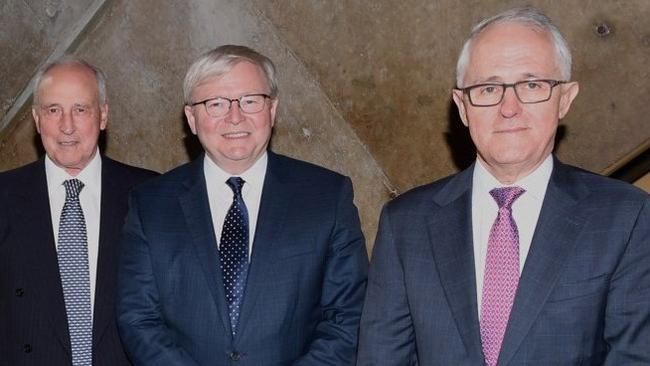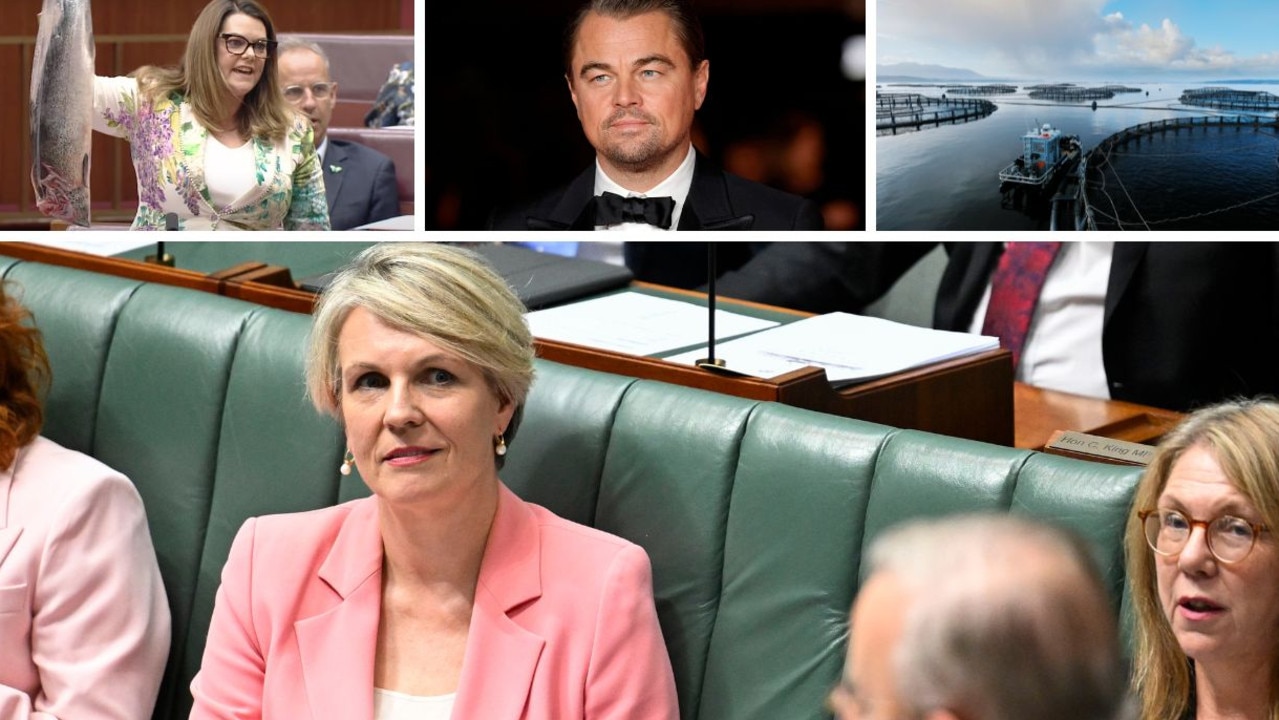Former leaders who won’t leave the centre stage
The emergence of Keating, Rudd and Turnbull as critics and activists ignites debate on role of former PMs.

The emergence of Paul Keating, Kevin Rudd and Malcolm Turnbull as activist former prime ministers sees them join Anthony Albanese and recalcitrant premiers as Scott Morrison’s most influential and outspoken critics ahead of an election unlike any in Australian living memory.
Their incarnation as born-again political participants has ignited a debate on the role of former prime ministers and whether their criticism of the government diminishes or strengthens Australian democracy.
Former deputy prime minister John Anderson said the interventionist former prime ministers had been exposed as “playing a sort of presidential style politics” and warned the risk was they “undermine democracy because they are in effect setting up an alternative head of authority”.
“It could be potentially lethal for the proper functioning of democracy,” he said. “You have people who have been duly elected through the democratic process to high positions of authority. They are then duly removed by the democratic process but go on to try and set up an alternative head of authority which is immensely distracting and undermining if it is misused.”
But former NSW premier and Australian foreign minister Bob Carr said “anything that energises political debate is good for our democracy” and that Keating, Rudd and Turnbull had an obligation to speak out given a “slump in the quality of political leadership and debate”.
“I think former prime ministers have got a public duty to use the knowledge acquired in all the high-pressure meetings they’ve been part of to fling our way all the facts and arguments they think are important. Their participation is part of our democracy,” Carr said.
The former leaders have emerged as a new political obstacle for the Prime Minister ahead of an unprecedented election campaign characterised by a divided federation and the heightened role of the premiers, newly invested with a national authority and profile because of their tough pandemic policies.
Turnbull emerges as a special case given his ongoing criticism of the party he once led, with new calls for him to hand in his Liberal Party membership from former Victorian premier Jeff Kennett and former Queensland premier Campbell Newman.
Newman, who resigned from the Liberal National Party and announced a federal Senate tilt for the Liberal Democrats, urged Turnbull to follow in his footsteps.
“The advice I would give to Malcolm is that he should follow what I’m doing and he should leave the Liberal Party and he should go and get involved in another party,” Newman said. “It’s either that or not offer opinion. It’s so contrary to the interests of the Liberal Party.
“The principled thing to do is, if you want to continue to play a very active role in public life which is contrary to the party you are a member of, I think you have no option but to pull the pin.”
The troika of former prime ministers regained the national spotlight last month for its condemnation of the government over its betrayal of the French in the scrapping of the $90bn submarine contract.
Writing in the pages of Le Monde, Rudd acknowledged it was “unusual for a former prime minister of a country to criticise the decisions of a successor prime minster in the opinion pages of a foreign newspaper”.
However, he condemned the “gross mishandling” of the decision to scrap the French contract in favour of a new nuclear submarine fleet as an Australian “foreign policy debacle”.
Keating warned the government had “turned over control of their armed forces to the US” while reorientating the nation towards “an anachronistic Anglosphere”.
Turnbull said the handling of the cancellation of the contract was “clumsy, deceitful and costly” and that Morrison had “treated the French Republic with contempt”.
“I am not getting any lectures on patriotism from Scott Morrison. I defended the national security of this country and its national interest and I know the way that he has behaved is putting that at risk,” he said.
Rudd and Turnbull have warned that Australia “continues to bury its head in the sand” on climate change and pushed for higher 2030 targets along with a firm commitment for the government to commit to a target of net zero.
While Morrison has not committed to attending the upcoming climate summit, Turnbull confirmed he would make the trek to Glasgow and declared: “History is made by those who turn up.”
But Kennett argued that Turnbull’s actions were not appropriate for a former prime minister, rejecting suggestions they were aimed at improving the fabric of Australian democracy.
“Is he doing it in the country’s interest? Of course not. Is he doing it to continually disrupt those who lead the country at the moment? Absolutely. Would he prefer the opposition to be in government? Probably yes.”
“He doesn’t have to be there (Glasgow). He didn’t have to tell us he’d been talking to Macron.”
Carr argued that Turnbull was providing leadership for Liberal members who wanted greater climate action. “Why shouldn’t Turnbull for example speak up for a whole strand of Liberal Party opinion, ashamed by the government’s tolerance of climate denialism. Why not?”
Former Liberal finance minister Nick Minchin said past leaders should become “elder statesmen or stateswomen” but they had an “obligation to the high office they held to act with due decorum and a sense of responsibility and appropriate obligation to the welfare of their nation which they were privileged to serve”.
“Former prime ministers like John Howard and Julia Gillard I think are exemplars of that approach … Regrettably there are a few ex-PMs who I think are not upholding those standards,” he said.
Kennett said he respected the way in which the “American system works whereby former presidents are held in high esteem”.
“Very rarely do they speak out about an incumbent,” he said. “I hold very dear the opportunity that was given to me to be part of an organisation that saw fit to give me the opportunity to be premier of Victoria. I cannot understand why former leaders federally do not embrace that same opportunity.”




To join the conversation, please log in. Don't have an account? Register
Join the conversation, you are commenting as Logout